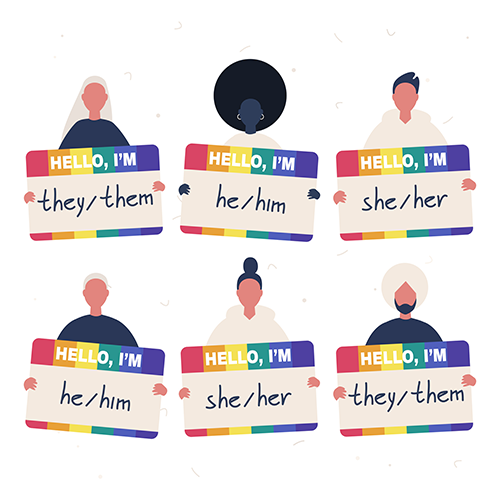Gender-Inclusive Guidelines
The HCPSS Gender-Inclusive Guidelines are intended to inform HCPSS students, staff, parents, and stakeholders of important HCPSS practices and procedures related to affirming students in the school system. This guidance applies to schools, school property, school-sponsored functions and activities, school buses or vehicles, and bus stops. HCPSS schools support a student’s assertion of their gender identity.
Please Note! The information on this page is adapted from the HCPSS Gender-Inclusive Guidelines and does not include the complete text. Select the link below to view and/or download the full guidelines
HCPSS Gender-Inclusive Guidelines →

All HCPSS students should feel comfortable expressing their gender identity. The needs of each student will be supported on an individual basis. In all cases, the goal is to ensure the safety, comfort, affirmation, and healthy development of the student while supporting their social integration and ending the stigmatization and violations of dignity. HCPSS strives to maintain the privacy of all students and families and to further the successful educational development and well-being of all students. As with all aspects of a student’s school experience, HCPSS believes that students do best when supported by family and community. However, parent consent is preferred but not required for schools to affirm student name and pronoun requests. HCPSS recognizes that supporting and affirming gender identity can be difficult to navigate for students and families. Staff in the HCPSS Department of Program Innovation and Student Well-being are available to discuss and consult regarding student supports.
Official Records
According to MSDE, official school records are Student Records Cards (1-7), transcripts, and diplomas. HCPSS is not required to use a student’s legal name or gender on non-official school records and MSDE does allow local school systems to determine if a presenting name is used on a diploma. HCPSS will use the name and gender requested by the student on non-official records or documents and diplomas.
The Maryland Student Records System Manual states “self-identification of a student’s gender is sufficient for local school system reporting of student record information to the MSDE.” The MSRSM allows students to self-identify as 1 – male, 2 – female, or x – non-binary (student identifies as neither male or female or both). Information on paper copy files, such as the student’s name of cumulative and health room files, will be amended if a change in gender is requested, as will records in the student information system. Most retroactive documents (old report cards, health documents, etc.) will not be amended. Students should meet with a school counselor to initiate the change process and discuss possible implications or outcomes.
Reporting Discrimination and Harassment
It is the intent of HCPSS to provide a safe school environment to all students, which includes students who identify as part of the LGBTQIA+ community. Any incident of discrimination, harassment, or violence will not be tolerated. These incidents will be given immediate attention, including investigation of the incident, taking appropriate corrective action, communicating with the students, parents, or others who need to know, and providing students and staff with appropriate resources.
Reports to the Title IX Coordinator should be directed to:
-
TitleIXCoordinator@hcpss.org
Title IX Coordinator, 10910 Clarksville Pike, Ellicott City, MD 21042
410-313-6654
Topics of Interest
Names / Pronouns
A student has the right to be addressed by a name and pronoun that corresponds to their gender identity. As noted in the HCPSS Student Names Guidance, parent consent is not required; however, it is HCPSS’ goal to be as inclusive of parents and families as possible. An official name or gender change is not required for staff to use the name and/or pronouns, and staff should honor what the student requests.

Name Masking
HCPSS students can request to mask a legal name assigned at birth. This is different than a student legally changing their name or using a preferred name, and will allow a presenting name to show on class rosters, report cards, IEPs, 504 plans, athletic rosters, student information system, learning management system, Naviance, yearbooks, applications tied to active directory, and Food Service information.
Legal name will continue to be used only on documents required to show legal name, in addition to College Board records (or correspondence) and possibly those with other institutions of continuing education.
Parents/guardians should be informed of the masking change since the new name and/or gender will show on documents parents/guardians and other students will see.
Restrooms & Locker Rooms
Each student will have access to a restroom in accordance with the student’s gender identity, considering the options in the school. Students should be given options and choice, including use of the restroom for the gender with which they identify and/or a safe and adequate alternative, such as a single all gender or gender inclusive restroom.
Each student should have access to a locker room in accordance with the student’s gender identity. Accommodations will be based on available facilities and will vary by school.
Interscholastic Athletics
As determined by the Maryland Public Secondary School Athletic Association (MPSSAA):
- Transgender students can participate on the interscholastic athletics team of the student’s birth gender.
- Transgender students can participate on interscholastic athletics teams of the gender that the student has transitioned to. This may be supported by medical documentation (hormonal therapy, sexual reassignment surgery, counseling, etc.) confirming transition of gender.
- Transgender students may compete on the interscholastic team of the gender the student identifies with, as recognized by the local school system and established in official school system records. This may differ from the student’s gender listed in school system records.
School Clubs
Clubs with a gender inclusive focus should run like any other club with clearly defined outcomes. Permission slips for participation are not required unless permission slips are required for participation in all other clubs.
The Equal Access Act (1984), 20 U.S.C. §7905 requires public secondary schools to provide equal access to school premises for extracurricular clubs. It also ensures that non-curricular student groups are afforded the same access to public secondary school facilities as other similarly situated student groups.